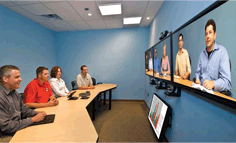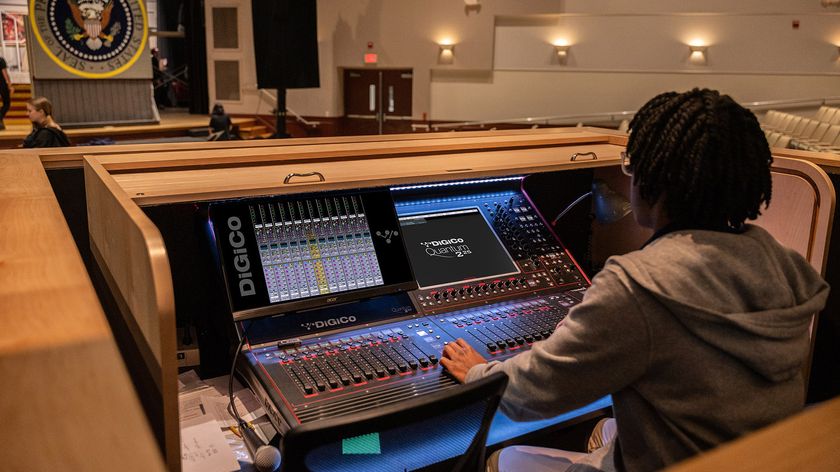How Conference Technologies, Inc. Became A South And Midwest Powerhouse
“There’s no question that recruiting is the key to our success.”
Managers Steve Reust, John Laughlin, Cathy Kellyand Matt McNeil participate in a telepresence session at the new CTI headquarters in St. Louis, MO.
That’s how John Laughlin, president and CEO of Conference Technologies, Inc. (CTI), described his company’s rapid growth. “The only skill I have that I’m really proud of is the ability to find the best people and hire them. We’ve managed to create an atmosphere where people who are passionate about building AV systems can come and work with others who share their values.”
This emphasis has helped CTI expand in the last few years from its St. Louis, MO base into five other Southern and Midwestern states: Kansas, Tennessee, Nebraska, Illinois, and now Arkansas.
CTI was founded in October, 1988 by Dennis Woodhouse (now retired) and his wife Jane, now the treasurer and chairman of the board. The goal from early on was to provide a complete range of AV services, including engineering and support for pro audio, projection, lighting, staging, and video. “If we don’t provide the services our customers expect from us,” Laughlin explained, “then we’re just going to introduce competition and undo relationships that we’ve worked hard to build.”
Among other things, CTI was an early innovator in videoconferencing technology. “Videoconferencing, in actual dollar volume, has only been a small part of CTI’s growth over the years,” Laughlin said, “but it has been a catalyst for many projects. Rooms that need VTC generally also need control, display devices, sound, lighting, and service after the fact.”
The most important thing that videoconferencing adds to a project, Laughlin said, is complication. “That gives us an advantage, because we tend to handle the details of complicated situations better than our competitors. It’s really the specialized, complicated solution that forms the bulk of our business.”
By 2001 the company was ready to begin expanding geographically. It opened its first branch office in the Kansas City area and then used it as a model for future expansion.
CTI routinely shares installers and technicians from one office to another. For example, the company was able to design and install six HD videoconferencing rooms last December for a major client, taking them from the receipt of the order to handing over the controls in just three weeks, without using any subcontractors. The project brought staff from Wichita, St. Louis, and Peoria, IL together to contribute a total of 430 man-hours of labor.
The disintegration of MCSi in 2003 helped speed the expansion process. In short order CTI launched two more branches, in Memphis, TN and Omaha, NE, and expanded their St. Louis staff. “The MCSi debacle made some of the best talent in the industry available, and we were able to bring some of our top competitors on board.”
The most crucial part of CTI’s expansion model is its recruiting method. “Probably our best hiring tool is our reputation within the manufacturer environment,” Laughlin explained. “When someone is unhappy and says to a manufacturers’ rep, ‘I really need to get into a more professional environment,’ they’ll generally steer them to us.
“We also spend a lot of relationship building time with people in the industry, including competitors. If somebody is struggling, or retiring, or ready for a move, we’ll generally hear about it. Of course, identifying the best talent is not good enough. It has to be the best talent that’s available.”
Laughlin is in the process now of building a new team in Little Rock, AR. His new branch manager, Bill Wall, came in through a friendship with John Holland, whom he had hired to take over Memphis last fall. He had Holland on his radar, in turn, for several years. “Once you recruit that top leader, others follow quickly and efficiently, because the right people want to surround themselves with good quality people as well,” Laughlin said. “We are extremely opportunistic. If there are people in the industry who want to be part of something better, and if they’ve clearly demonstrated they’re among the best in industry, we will find them and hire them. That policy has clearly helped our health and success over the years. It’s all about people.”










